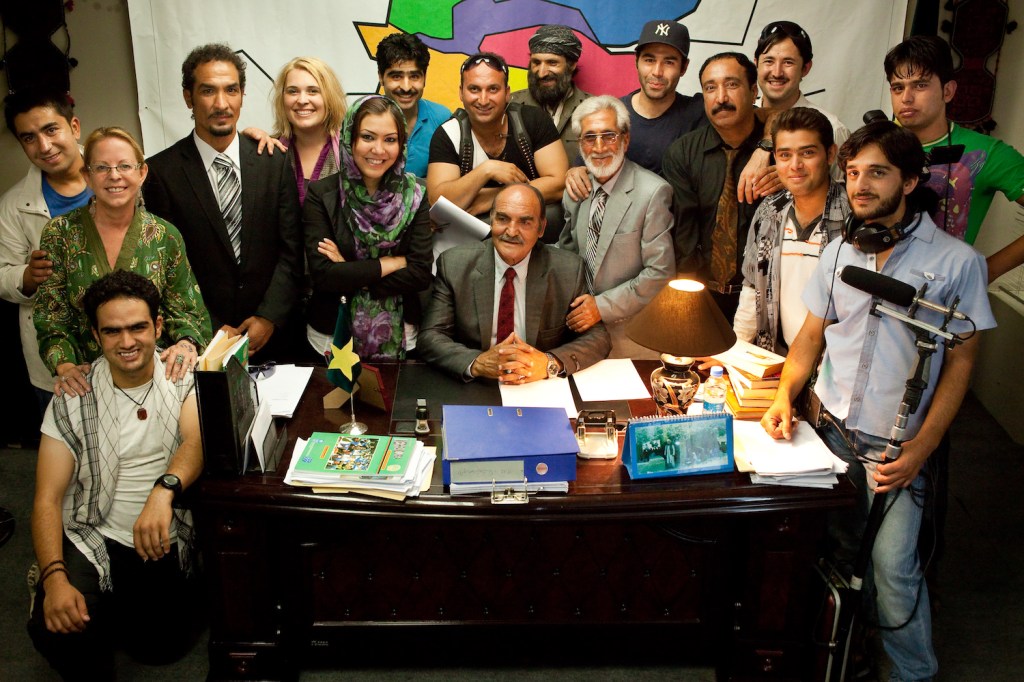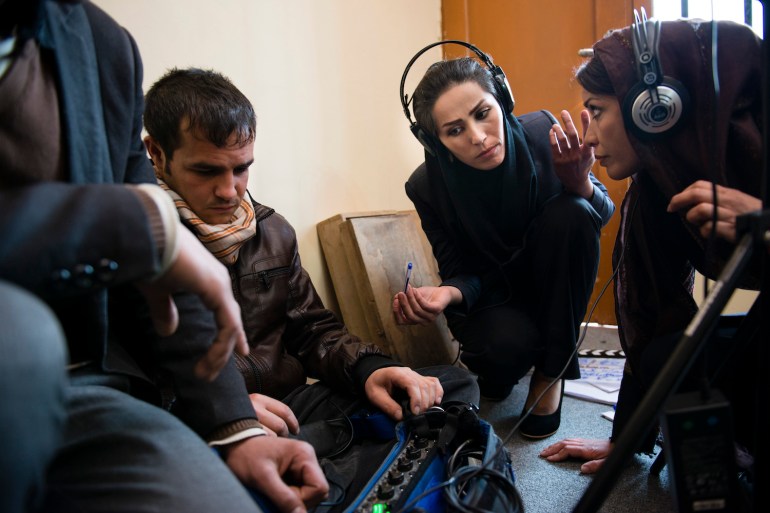Since Afghanistan fell to the Taliban last August, a group of Australian filmmakers have been working to aid friends and former colleagues now in danger.
The group includes Muffy Potter, a development executive at Kojo Studios, her business partner Trudi-Ann Tierney, and writer, director and producer Max Walker of Ironbark Media.
All are former employees of Kabul’s Moby Group, a media company run by Afghan-Australian Saad Mohseni.
The trio have been working for months to support ex-colleagues in Afghanistan who now fear for their lives given their background in the film and television industry. There even reports of former industry workers burying their camera equipment in the ground.
Potter tells IF that many of the shows her Afghan colleagues created and produced were “vital in disseminating counter-insurgency messaging and messaging that supported Western stabilisation efforts around democracy, law and order, governance and women’s rights”.
“Now they’re left behind under the very regime that they spent their professional lives deriding. These colleagues are very much in danger and the Australian government cannot leave them behind,” she says.
“We’ve advised friends to bury their documents, completely wipe their computers and clean their social media of any Western association, which is pretty hard when you’re an actor or presenter of a TV show.
“The West told them for the last two decades that they would be protected and they could stand up and tell these stories because they would have security backing. That has not happened. I talk very honestly as I feel part of it.”
Or as Walker recently put to the Screen Forever conference: “I feel I’ve left my mates on the slopes of Gallipoli.”
Since August, the group has been raising money for their colleagues firstly to get them to safety, and then to offer day-to-day support – almost all now are unemployed.
In addition to a crowdfunding effort that has so far amassed more than $30,000, Walker has been running Fan-Force screenings of Shereen, a film he directed in Afghanistan in 2015, to help raise further money.
It follows a single mother and family court secretary, risking everything to keep her job and her freedom.
Shereen served as a pilot for a successful drama series, directed by Ghafar Azad, that won international acclaim, including being nominated for the mini-series prize at the 2016 Seoul International Drama Awards alongside projects with vastly higher budgets like Mr. Robot and The Night Manager.

Further, Potter, Tierney and Walker have been working to help their Afghan colleagues to be resettled in other countries. Presently, there is a group of around 60 people they aim to obtain humanitarian visas for in Australia.
The group consists of producers, directors, editors, soundies and actors, and Potter is hopeful that given the current skills shortage in the screen sector that Federal Government will be receptive to their applications.
“They have great English, they’re extremely capable. They’ve worked extensively with people from the West,” she says.
“I think there will be some wonderful storytellers in this group that could come to Australia and join our industry. I would certainly be hiring people immediately who I could rely on.”
In their campaign, Potter, Tierney and Walker have found backing from other industry colleagues, including from Screen Producers Australia (SPA), the Australian Directors Guild (ADG) and the Australian Writers’ Guild (AWG) who have each provided written statements in support.
As AWG executive director Claire Pullen tells IF: “AWG supports the campaign to seek humanitarian visas for Afghan casts and crew who produced world-class TV content for audiences in Afghanistan, alongside Australian filmmakers. They would be welcomed by our local screen community.”
They are hopeful of further letters of support from the wider sector, with Walker presently in discussion with a number of broadcasters and platforms.
Greg Apps, of Greg Apps Casting, tells IF that Australia’s position in the creative world could only be enhanced by nurturing Afghan artists.
“Australia is in a unique position to nurture and encourage minority cultural voices, such as Afghani. If not us, then who?”
Similarly, Kojo Studios executive director Linda Ujuk tells IF: “Refugees have been an integral part of Australian screen stories. Kojo Studios is committed to diverse storytelling and supports Afghan TV workers who come to our country. We’ve specific projects under our premium brand, Kojo Originals, that would greatly benefit from their unique creative skills and we welcome their contribution. “
Potter is working on a project with Kojo Studios via her company Rantan Productions, based on Tierney’s book Making Soapies In Kabul: Hot Days, Crazy Nights and Dangerous Liaisons in a War Zone. In development as a limited series, it is titled The Stories We Told and set both in Australia and Afghanistan.
Likewise Walker is working on a number of Afghanistan-themed projects via company Ironbark Media, and continues to collaborate with one of the stars of Shereen, Hasiba Ebrahimi, currently living in Australia on a protection visa.
“She would love to do more stories like we did with Shereen, working with young refugees and telling their stories with an authentic voice, with the same model we used in Afghanistan,” he tells IF.
“A lot of those people, that was the first time they’d been in front of a camera or worked in a crew behind a camera. They went on to make amazing shows for their people and country. I’m absolutely certain that can occur here as well. Not just from a technical point of view, but just the yarns – they’re mind blowing, they really are. They’re not told enough in this country.”
Speaking of her friends still back in Afghanistan, Potter talks of their resilience and good humour in the face of danger.
“One thing that would probably surprise the average Australian is the shared sense of humour between Australians and Afghans. It’s really genuine. Not an hour would go by without having a good belly laugh with my colleagues. I don’t actually know why it is; I think there’s a lot of sarcasm.
“So when we’re talking to people, there’s still funny quips, jokes, and a lot of love between everyone. There’s a lot of swapping pictures of our kids. It’s really special and all the families that we’re helping and the applicants to the Australian Government, they would just make fantastic citizens. They would make this life so wonderful, and would complement Australia.”
A Fan-Force screening of Shereen will be held in Canberra, Monday April 11. Book here.



